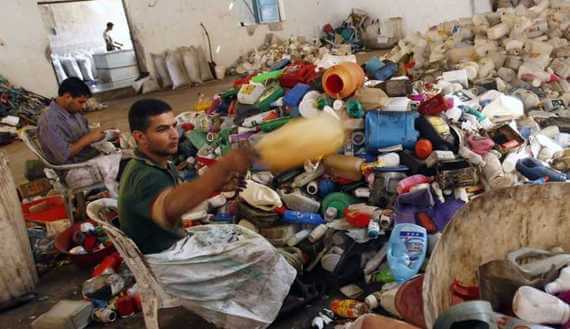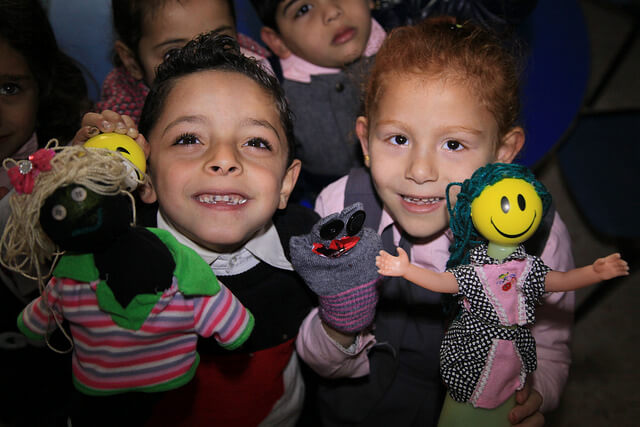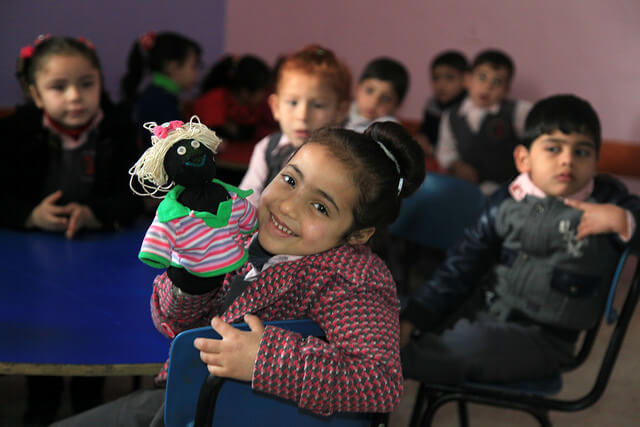Nothing goes to waste in Gaza. Recycling has become a way of life. But, it’s not so much about protecting the environment in Gaza. It’s much more personal. It’s about survival.
After ten years of closure, three wars that devastated farmland and destroyed homes, soaring unemployment and the lack of access to materials to rebuild their communities, Gazans still find creative ways to survive. Recycling is becoming a way of life and the benefits reach beyond the individual.
That may contrast with wealthier, more stable communities in the US or Europe, where people now question the cost and value of recycling. Here in Gaza, where we can barely eke out a living, recycling makes good economic sense..

Palestinian laborers sort plastic containers before they are recycled in a factory in Abasan in the southern Gaza Strip (Photo: REUTERS/Ibraheem Abu Mustafa)
A few weeks ago, a woman in her fifties knocked on my door asking for empty plastic bottles and cans. I was a bit surprised since this is not the usual thing people do in Gaza. Om Shafiq explained that her husband died a few years ago so she has been the breadwinner of her family of five. She stood before me with dignity, not looking for anyone’s pity. And then she explained that her teenage son had dropped out of school to help her and now collects plastic from the trash people throw away to send for recycling at one of the few remaining factories in Gaza. He gets some much-needed cash for his family and the factories can grind down the plastic, mix it with other ingredients and produce irrigation pipes, clothes hangers and plastic bags.
It’s a win-win situation. Om Shafiq’s family can finally buy supplies and food and local industries can thrive. Om Shafiq readily admits she knows nothing about recycling but she does know now that waste has value.
Not all waste is valuable. Untreated, it can be a health hazard. According to published clinical records in Gaza, residents of rural communities, particularly women and children, are at high risk of infection from inhaling poisonous and harmful fumes created by agricultural waste that’s been discarded improperly near homes and schools.
Farmer Abu Waheed used to burn dead plants and other waste from his farmland or dump it on agricultural roads. He worried that waste left on his farm would expose his crops to disease. But he couldn’t afford to have the waste trucked away.
Media reports estimate that Gaza farmers produce more than 100 tons of waste a day. That caught the attention of a community organization, known as Park, which initiated a waste management project to recycle the agricultural waste into organic compost that benefits farmers and protects the health of their communities. Farmers like Abu Waheed in Khan Younis soon realized it didn’t take much to turn waste into something of value to help him survive. One farmer is even reported to have found a way to make coffee from the excess seeds of the palm trees on his farm.

Jabalia camp children with recycled dolls. Rania Elhilou photographer
I recently visited a preschool in the overcrowded Jabalia refugee camp near Gaza City. Resources are really limited in the impoverished community but teachers have found creative ways to transform discarded clothes, cardboard, old toys and buttons into colorful puppets and learning materials for the children. Their creativity has reached beyond the classroom. Parents who have lost their jobs and spend a lot of time worrying about their survival are learning how to turn old clothes or a pair of socks into toys that bring a bit of joy and laughter to their homes.
When I read about the value of recycling in the past, it didn’t have much meaning for me on a personal level. It was all about saving the environment and rescuing the planet. I didn’t realize how recycling can also give hope and a helping hand to so many impoverished communities in Gaza.
My conversations with Om Shafiq, with farmers and teachers, opened my eyes to its value on so many levels. I had not understood how recycling can help a family survive, bring some joy for young children in difficult times and also benefit the environment.
Now, every Friday, I collect empty bottles and cans from friends and neighbors to give to Om Shafiq and my neighbors and I save old socks and pieces of cloth to recycle into fun puppets and toys for our children.

Jabalia camp, children with recycled dolls, photo by Rania Elhilou
Rania Elhilou is communications officer in Gaza for ANERA, a US non-profit that has provided health, education and development services for 47 years to improve the lives of people in the West Bank, Gaza and Lebanon.
Source Article from http://mondoweiss.net/2016/03/recycling-for-survival-in-gaza/
 RSS Feed
RSS Feed















 March 5th, 2016
March 5th, 2016  Awake Goy
Awake Goy  Posted in
Posted in  Tags:
Tags: 













